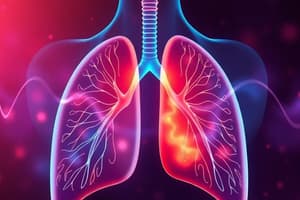Podcast
Questions and Answers
What is the normal value of the total lung capacity (TLC)?
What is the normal value of the total lung capacity (TLC)?
- 4600 ml
- 3500 ml
- 2300 ml
- 6000 ml (correct)
Which lung volume is measured using the Helium dilution method?
Which lung volume is measured using the Helium dilution method?
- Inspiratory capacity
- Vital capacity
- Tidal volume
- Residual volume (correct)
What is the normal value of the functional residual capacity (FRC)?
What is the normal value of the functional residual capacity (FRC)?
- 3500 ml
- 2300 ml (correct)
- 4600 ml
- 1200 ml
Which of the following statements about vital capacity (VC) is true?
Which of the following statements about vital capacity (VC) is true?
Which lung capacity is calculated by adding tidal volume and inspiratory reserve volume?
Which lung capacity is calculated by adding tidal volume and inspiratory reserve volume?
What is the primary function of a spirometer?
What is the primary function of a spirometer?
Which of the following lung volumes is defined as the amount of air breathed in or out during quiet respiration?
Which of the following lung volumes is defined as the amount of air breathed in or out during quiet respiration?
What is the formula for calculating Total Lung Capacity (TLC)?
What is the formula for calculating Total Lung Capacity (TLC)?
Which lung capacity measurement does not change with time and is expressed in mL or L?
Which lung capacity measurement does not change with time and is expressed in mL or L?
What is the value of the Inspiratory Reserve Volume (IRV)?
What is the value of the Inspiratory Reserve Volume (IRV)?
Residual Volume (RV) is best described as:
Residual Volume (RV) is best described as:
FEV1 is important because it measures:
FEV1 is important because it measures:
Which of the following is NOT a lung volume?
Which of the following is NOT a lung volume?
Flashcards are hidden until you start studying
Study Notes
Spirometer
- Instrument used to determine lung volumes and capacities
- Records lung volumes and capacities
Lung Volumes and Capacities
- Total lung volume at the end of maximal inspiration is divided into volumes and capacities
- Lung volume is the volume of air that can be inspired or expired in a breath
- Lung capacity is the sum of two or more lung volumes
Types of Lung Volumes and Capacities
- Static Lung Volume and Capacities: Time independent and expressed in ml or liters
- Dynamic Lung Volume and Capacities: Time dependent and expressed in ml/min or L/min
Lung Volumes
Tidal Volume (TV)
- Volume of air breathed in or out during quiet respiration
- Normal value: 500 ml
Inspiratory Reserve Volume (IRV)
- Volume of air that can be maximally inspired after a normal inspiration
- Normal value: 3000 ml
Expiratory Reserve Volume (ERV)
- Volume of air that can be maximally expired after a normal expiration
- Normal value: 1100 ml
Residual Volume (RV)
- Volume of air that remains in the lungs after a maximal expiration
- Normal value: 1200 ml
- Increased in old age and emphysema
Measuring Lung Volumes
- All lung volumes except residual volume can be measured with a spirometer
- Residual volume can be measured by Helium dilution method
Lung Capacities
- Sum of one or two lung volumes
Inspiratory Capacity (IC)
- Maximum volume of air that can be inspired after a normal expiration
- Formula: TV + IRV
- Normal value: 3500 ml
Vital Capacity (VC)
- Maximum volume of air that can be forcefully expelled after a maximal inspiration
- Formula: TV + IRV + ERV
- Normal value: 4600 ml
Functional Residual Capacity (FRC)
- Volume of air remaining in the lungs after a normal expiration
- Formula: RV + ERV
- Normal value: 2300 ml
Total Lung Capacity (TLC)
- Total volume of air contained in the lungs at the end of a maximal inspiration
- Formula: TV + IRV + ERV + RV
- Normal value: 6000 ml
Other Lung Measures
- Timed Vital Capacity (TVC) or Forced Vital Capacity (FVC): Total volume of air that can be exhaled forcefully from total lung capacity
- Minute Volume (MV) or Pulmonary Ventilation (PV): Total volume of air breathed in or out per minute
- Maximum Breathing Capacity (MBC) or Maximum Ventilatory Volume (MVV) or Maximum Voluntary Ventilation: Maximum volume of air that can be breathed in or out per minute during maximal effort
Studying That Suits You
Use AI to generate personalized quizzes and flashcards to suit your learning preferences.




